PakAlumni Worldwide: The Global Social Network
The Global Social Network
Pakistan's Human Development in Musharraf Years- Highest in Pakistan's History
Pakistan's HDI grew an average rate of 2.7% per year under President Musharraf from 2000 to 2007, and then its pace slowed to 0.7% per year in 2008 to 2012 under elected politicians, according to the 2013 Human Development Report titled “The Rise of the South: Human Progress in a Diverse World”.
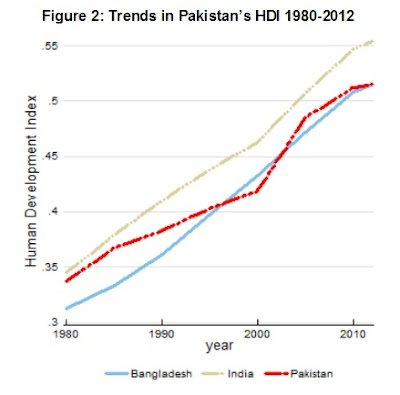 |
| Source: Human Development Report 2013-Pakistan |
At 0.515, Pakistan's HDI is lower than the average HDI value of 0.558
for South Asia which is the second lowest among the various regions of the world tracked by UNDP. Between
2000 and 2012, the region registered annual growth of 1.43% in HDI
value, which is the highest of the regions. Afghanistan achieved the
fastest growth (3.9%), followed by Pakistan (1.7%) and India (1.5%),
according to the United Nations Development Program.
Overall, Pakistan's human development score rose by 18.9% during Musharraf years and increased just 3.4% under elected leadership since 2008. The news on the human development front got even worse in the last three years, with HDI growth slowing down as low as 0.59% — a paltry average annual increase of under 0.20 per cent.
Who's to blame for this dramatic slowdown in the nation's human development? Who gave it a low priority? Zardari? Peoples' Party? Sharif brothers? PML (N)? PML (Q)? Awami National Party? Muttahida Qaumi Movement? The answer is: All of them. They were all part of the government. In fact, the biggest share of the blame must be assigned to PML (N).
Sharif brothers weren't part of the ruling coalition at the center. So why should the PML (N) share the blame for falling growth in the nation's HDI? They must accept a large part of the blame because education and health, the biggest contributors to human development, are both provincial subjects and PML(N) was responsible for education and health care of more than half of Pakistan's population.
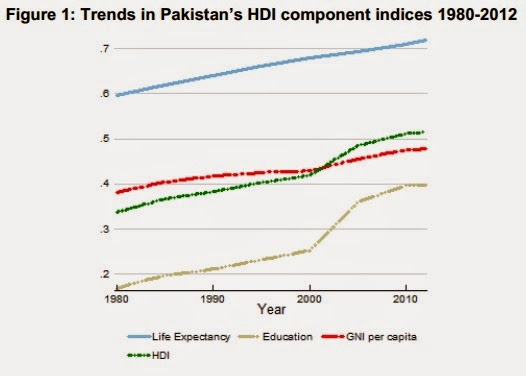 |
| Source: The Rise of the South: Human Progress in a Diverse World |
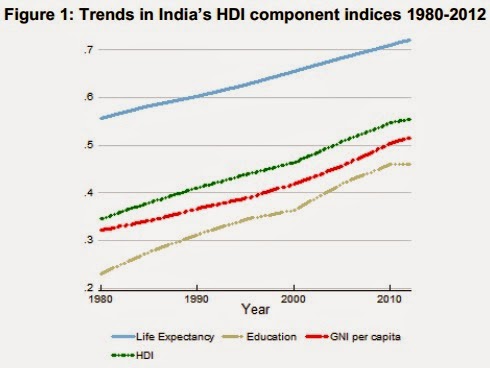 |
| Source: The Rise of the South: Human Progress in a Diverse World |
Going further back to the decade of 1990s when the civilian leadership of the country alternated between PML (N) and PPP, the increase in Pakistan's HDI was 9.3% from 1990 to 2000, less than half of the HDI gain of 18.9% on Musharraf's watch from 2000 to 2007.

Acceleration of HDI growth during Musharraf years was not an accident. Not only did Musharraf's policies accelerate economic growth, helped create 13 million new jobs, cut poverty in half and halved the country's total debt burden in the period from 2000 to 2007, his government also ensured significant investment and focus on education and health care. The annual budget for higher education increased from only Rs 500 million in 2000 to Rs 28 billion in 2008, to lay the foundations of the development of a strong knowledge economy, according to former education minister Dr. Ata ur Rehman. Student enrollment in universities increased from 270,000 to 900,000 and the number of universities and degree awarding institutions increased from 57 in 2000 to 137 by 2008. In 2011, a Pakistani government commission on education found that public funding for education has been cut from 2.5% of GDP in 2007 to just 1.5% - less than the
annual subsidy given to the various PSUs including Pakistan Steel and PIA, both of which continue to sustain huge losses due to patronage-based hiring.
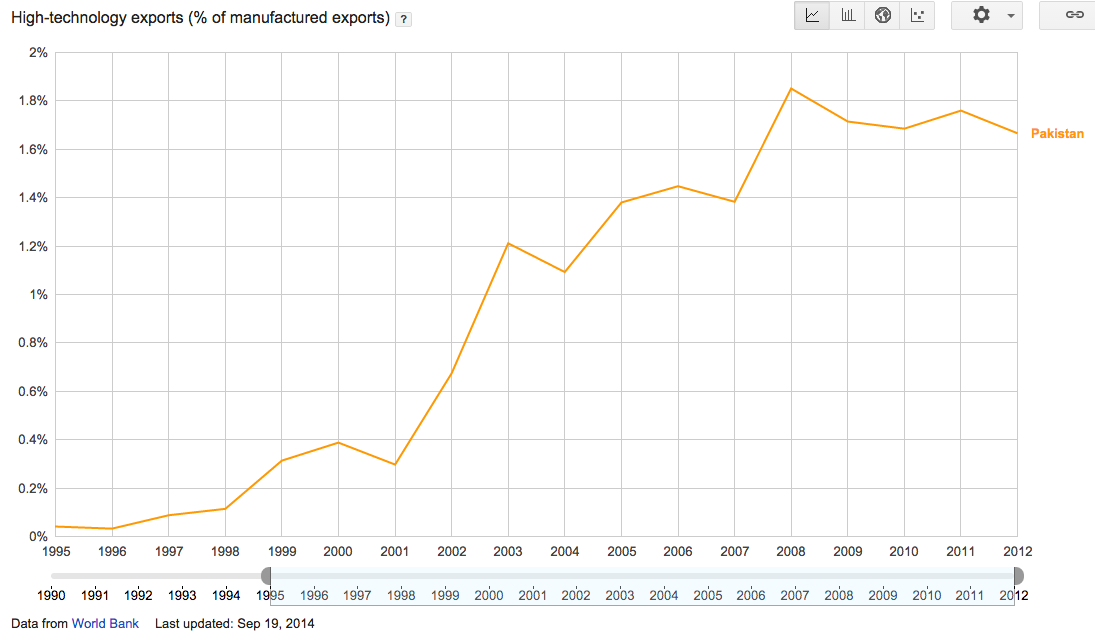 |
| Pakistan's High-Tech Exports Tripled as % of Manufactured Exports. ... |
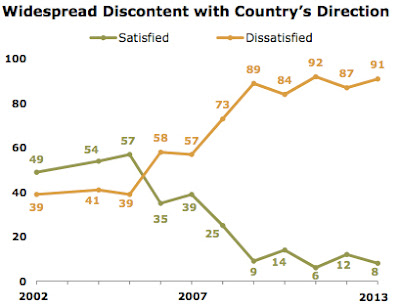 |
| Source: Pew Surveys in Pakistan |
Looking at examples of nations such as the Asian Tigers which have achieved great success in the last few decades, the basic ingredient in each case has been large social sector investments they have made. It will be extremely difficult for Pakistan to catch up unless similar investments are made by Pakistani leaders.
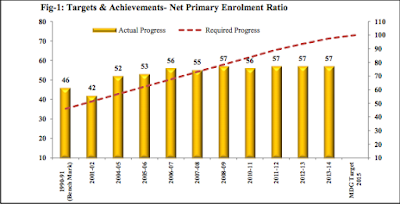 |
| Primary Enrollment Source: Economic Survey of Pakistan |
 |
| Youth Literacy Rate Source: Economic Survey of Pakistan |
As Pakistanis prepare to go to the polls on May 11, it is important that the voters demand an explanation from the incumbent political parties for their extremely poor performance in the social sector. Without accountability, these politicians will continue to ignore the badly needed investments required to develop the nation's human resources for a better tomorrow. Forcing the political leaders to prioritize social sector development is the best way to launch Pakistan on a faster trajectory.
Here's a video discussion on elections in Pakistan:
Upcoming Elections in Pakistan: How different parties are positioni... from WBT TV on Vimeo.
Related Links:
Haq's Musings
Saving Pakistan's Education
Political Patronage Trumps Public Policy in Pakistan
Dr. Ata-ur-Rehman Defends Pakistan's Higher Education Reforms
Twelve Years Since Musharraf's Coup
Musharraf's Legacy
Pakistan's Economic Performance 2008-2010
Role of Politics in Pakistan Economy
India and Pakistan Compared in 2011
Musharraf's Coup Revived Pakistan's Economy
What If Musharraf Had Said No?
-
Comment by Riaz Haq on April 9, 2013 at 10:08pm
-
Here's a News Op Ed by Dr. Atau-ur-Rehman:
For the last five years a strange drama is being played out by the Election Commission of Pakistan to support the biggest crooks in the land. This relates to supporting hundreds of those parliamentarians that forged their degrees in order to become eligible to contest the elections in 2008, and then looted thousands of billions of rupees after coming into power.
According to Transparency International of Pakistan, a colossal sum of Rs18,000 billion (that is Rs100 crores repeated 18,000 times over!) was looted by those in power in the last five years, drowning the country in debt. This amounts to about 180 billion dollars.
Considering that we have been quibbling over aid from the USA that is only about 1-2 billion dollars annually, it shows the magnitude of what has been actually going on in the country. Pakistan has been skimmed dry and is today essentially a bankrupt country. We will be unable to pay the next installment due to the IMF unless we can get a loan from somewhere to help us do so.
All this went on under the nose of our judiciary and the army who watched helplessly as the loot and plunder continued unabated. Many Neros were just playing with the fiddle while Rome was burning. The Election Commission even ignored the orders of the Supreme Court issued about four years ago to have the degrees of the elected ‘gentlemen’ verified and looked the other way while daylight robberies on our national exchequer continued. The acute poverty that has resulted across the country has aggravated the law and order situation.
A former prime minister has been charged with massive corruption involving the hiring of obsolete power generating plants at exorbitant prices. The cost of power generation from these plants is over Rs50 per unit as opposed to Rs6-8 per unit from other plants. Money has been transferred under hand to foreign bank accounts while industries have been devastated. Had the Election Commission done its job five years ago many of these crooks that ruled us would not have been able to perform their villainy.
What is alarming is that the ‘save the crooks’ approach still continues and attempts are being made to allow these very fraudsters to escape from scrutiny and participate in the next elections. This scheme has been recently exposed in a letter written by the chairman Higher Education Commission to the chief election commissioner; it has also been sent to the chief justice of the SC.
The Election Commission, apparently bowing to political pressures, has cleared 27 of those members of parliament that had been found to have fake degrees. It may be noted that the ECP has no legal right to declare degrees fake or genuine. The HEC is the only institution that has these powers and the step taken by the ECP to declare the degrees as genuine after the HEC had found them to be fake and declared them to be so is illegal.
The HEC has formally informed the ECP of this vide its letter of March 4, 2013. The Supreme Court should take suo motu notice of this and if it is found that the Commission is guilty and continuing its ‘save the crooks’ policy, then a new commission should be constituted.
----
Pakistan is at a crossroads. We may be able to save this country if we can get clean people in the government and there is a huge responsibility on the Election Commission of Pakistan to ensure this. Alas it appears that the Election Commission is continuing its ‘save the crooks’ policy and failing to honour its own commitment – that it will take criminal action against all those ‘gentlemen’ who continue to refuse to produce their documents for scrutiny.There are 189 such persons who have refused to do so till today and the Election Commission continues to look the other way. This is a national shame.
http://www.thenews.com.pk/Todays-News-9-168244-Our-national-shame
-
Comment by Riaz Haq on April 10, 2013 at 8:54am
-
Here's a Daily Beast piece on girls' education in Pakistan:
Humaira Bachal was just a teenager when she looked around her impoverished Karachi neighborhood at the children roaming the barren streets, and realized that she and her sister were the only ones who were going to school. Bachal’s mother was making sure her daughters got an education, against her father’s wishes. When her father discovered she was going to take a high school entrance exam, he beat her mother. He also beat her. She took the exam anyway. And then, determined to improve the shameful number of girls completing a primary education in Pakistan—only 59 percent—Bachal she started teaching a handful of local children in her home.
A decade later, Bachal was sitting on stage in an ornate theater at Lincoln Center in New York, talking about the 1,200-student school she runs in a gang-ridden part of Karachi through the Dream Foundation Trust, which she created and runs. Bachal “doesn’t take any nonsense. And the [local] men respect that,” says documentarian Sharmeen Obaid Chinoy (CEO, SOC Films), who made a movie featuring the Pakistani activist and who was also on stage for the fourth annual Women in the World Summit, hosted by Newsweek and The Daily Beast. Along with her fellow Pakistani panelist Khalida Brohi (founder and director, Sughar Women’s Program) and of course Malala Yousafzai, all of whom began their education activism as teenagers, Bachal represented a major thread woven through the 2013 summit: the promise of the rising generation of young women activists, entrepreneurs, and leaders.
Call it the girls-who-change-the-world summit. Of course there were many veteran activists among the featured delegates, but there was also a sense that the current crop of tech-savvy young women may be able to change women’s education and labor-force participation even more quickly and decisively than their immediate predecessors. As Hillary Clinton put it in her summit address, “Much of our advocacy is a top-down frame. It’s past time to embrace a 21st-century approach to advancing the opportunities of women and girls” by empowering youthful, grassroots leaders.
----
In India and Pakistan, the poorest 20 percent of boys get five more years of education than girls do.”Technology
Though women are rocking education in the United States—they now get the majority of both college and graduate degrees—they are sorely underrepresented in science, technology, engineering, and mathematics fields, known in the jargon as STEM. In fact, they’ve lost ground in the past decade. As the summit’s “Grooming Titans of Tech” panel moderator Chelsea Clinton pointed out, the number of female computer science majors has dropped from 20 to 12 percent in the past decade. Reshma Saujani, the founder of the organization Girls Who Code, a nonprofit that teaches underprivileged teens how to code in computer science languages, is looking to change those dreadful numbers. Saujani bragged to the WITW audience about how evangelical her first group of graduates is: they teach their friends what they learn in their coding classes.....
http://www.thedailybeast.com/witw/articles/2013/04/10/from-pakistan...
-
Comment by Riaz Haq on April 15, 2013 at 9:32pm
-
Pakistan's GDP as percentage of world GDP remained flat 0.58% from 1990 to 2000, and then increased to 0.63% in 2010, according to Global Finance website.
http://www.gfmag.com/gdp-data-country-reports/204-pakistan-gdp-coun...
-
Comment by Riaz Haq on April 16, 2013 at 11:13am
-
A recent UNESCO report shows that Pakistan had 162 science and tech researchers per million people in 2009, a 2X increase from from 80 in 2005.
http://stats.uis.unesco.org/unesco/TableViewer/document.aspx?Report...
By contrast India had 152 S&T researchers per million inhabitants in 2009, up from 136 in 2005.
http://stats.uis.unesco.org/unesco/TableViewer/document.aspx?Report...
-
Comment by Riaz Haq on April 21, 2013 at 3:52pm
-
Here's an excerpt of a Tribune Express Op Ed by Prof Hasan Askari Rizvi on relentless pursuit of Musharraf:
As the Islamabad High Court has taken the initiative to nail down former president General (retd) Pervez Musharraf, most civilian political leaders are happy and blame him for Pakistan’s political ailments. The Senate passed a resolution on April 19 asking for initiation of legal proceedings against him on the charge of high treason that carries the death sentence. Some of the civilian leaders want Musharraf to be tried as a common criminal so as to show that everybody is equal before law.
It is interesting to note two ironies of history. First, Pakistan’s Supreme Court has never delegitimised a military ruler when he was in power. Yahya Khan was declared usurper in April 1972, four months after he was forced out of office. General Pervez Musharraf was declared to have acted in violation of the Constitution in November 2007 by imposing what he described as an emergency, in a Supreme Court judgment delivered July 2009, only 11 months after he lost power.
Second, whereas Musharraf who demonstrated the arrogance of power while in office is now down and under, the key issue is to maintain a distinction between justice and revenge on the part of the political forces who suffered during the Musharraf years. There is a long tradition in Pakistan for seeking ‘exemplary punishment’ or death sentence for former rulers. In all such cases, the argument is that it would establish the supremacy of law in Pakistan.
Now suddenly, this caretaker government is faced with the unexpected question of the arrest and trial of Pervez Musharraf. The Supreme Court wants the caretaker federal government to explain its position on initiating the trial of Pervez Musharraf on high treason under Article 6 of the constitution....Given Pakistan’s delicate civil-military relations, it is important that the political leaders and civilian state institutions ensure that overenthusiasm to pin down Musharraf does not turn into a propaganda drive against the military. Any strain in civil-military relations can be destabilising, especially when the military is doing election duties and fighting terrorism.
-
Comment by Riaz Haq on April 21, 2013 at 5:35pm
-
Here's Daily Times on Chusdhry Shujaat Husain of PML (Q) warning to consequences of haste in prosecuting Musharraf:
Chaudhry Shujaat Hussain on Sunday urged all those concerned with the Pervez Musharraf treason case to avoid taking any step whose consequences they will not be able to control afterwards. Talking to the media, the PML-Q president said that it was a sensitive issue that could have wider repercussions. “When the election campaign is in full swing, this is certainly not the time for taking such hasty steps, as it would be detrimental to national interest and the interests of democracy,” he said. The senator said that he had always spoken up against the politics of revenge and victimisation, adding that any attempt to humiliate either an individual or an institution would be counterproductive and dangerous. Shujaat warned that this was not simply a matter pertaining to one personality, as it could also open up a Pandora’s box.
http://www.dailytimes.com.pk/default.asp?page=2013\04\22\story_22-4-2013_pg1_4
-
Comment by Riaz Haq on April 29, 2013 at 4:50pm
-
Here's an FT report on Pak Army officers' unease over Musharraf's treatment:
Pakistani military officers have complained about the way the armed forces are being treated by politicians and the media ahead of the May 11 general election, stoking fears of renewed military interference in politics after five years of civilian rule.
“Obviously, there is unease among them [army officers],” said Mushahid Hussain Sayed, who chairs the Senate defence committee. “They see the army being maligned or attacked.” He was commenting on a meeting he had in Islamabad on Friday with 75 mid-career army officers from the Command and Staff College in the western city of Quetta.
According to one serving army general, army officers are unhappy, among other issues, about the treatment of Pervez Musharraf, the former army chief and military dictator who returned from exile to contest the polls but was arrested on charges of treason and other offences.
Officers were particularly irked by images on Pakistani television news channels showing lawyers beating some of Mr Musharraf’s supporters while shouting insults against the man who ran Pakistan for nearly a decade until 2008.
“This treatment has triggered tensions,” the general said. “People are worried about this situation spinning too much out of control.”
Public criticism of politicians and civilian institutions by army officers has been rare in recent years, but the complaints aired at the meeting between the officers and Mr Sayed have been extensively reported by the Pakistani media.
Mehmood Durrani, a retired Major General and former national security adviser, said there was a belief that “the army has become everyone’s favourite whipping boy. When anything goes terribly wrong in Pakistan, it’s because of the army.”
Mr Sayed, the senator, said officers thought the sacrifices they were making in fighting al-Qaeda and the Taliban in the regions bordering Afghanistan were not sufficiently appreciated. “The feeling is that while middle ranking officers are fighting on the front lines, the institution is getting attacked,” he said.
On Monday, eight people were reported killed in Peshawar by a suicide bomber. Human Rights Watch, the international pressure group, meanwhile urged the Pakistani military to provide security for the election in a “non-partisan manner” following numerous Taliban attacks on democratic politicians.
For the moment, analysts say, there are no signs of the army preparing to seize power under General Ashfaq Pervez Kayani, the chief of staff who has consistently favoured keeping the army out of politics. But the mood could change if army officers believe Mr Musharraf is being badly treated.
“One of the telling indications of things to come will be Musharraf’s trial. If the army concludes that he will not get a fair trial, they will make their resentment known further,” says Hasan Askari Rizvi, an analyst and author of a book on the Pakistan army.
“The army can react by communicating messages discretely to judges and politicians and they can launch a media campaign by leaking information on key politicians to journalists.”
Pro-democracy activists, however, want Mr Musharraf put on trial on a range of charges. He is accused of involvement in both the killing of a prominent tribal leader from Baluchistan province and the arrests of judges and protesting lawyers during his time in power.
The army has ruled Pakistan for almost half its life as an independent state since 1947.
http://www.ft.com/cms/s/0/0167cd10-b0bb-11e2-80f9-00144feabdc0.html
-
Comment by Riaz Haq on June 24, 2013 at 9:18am
-
Here's a Guardian story Sharif's decision to try Musharraf for treason:
The former military dictator Pervez Musharraf should be tried for high treason, Pakistan's prime minister said, raising the prospect of a serious clash between the country's civilian and military masters.
A treason trial would mark the first time in Pakistan's history that a military ruler has been held accountable, and the decision was cheered by many who believe the country's overweening army needs to accept the primacy of elected politicians.
The announcement by Nawaz Sharif, Pakistan's recently elected prime minister, ended months of speculation over whether the government would dare take on a former president and army chief who could face the death penalty if found guilty of overturning the country's constitution.
Only the government is able to try someone for treason, for which a special court would have to be established.
Although Musharraf is currently under house arrest and has negligible support in the country, many observers have long claimed the still powerful military elite would never allow a civilian court to try one of its former chiefs.
"Musharraf is still more popular in the army than [his successor General Ashfaq Parvez] Kayani," said a lawyer, Chaudry Faisal Fareed.
He said Sharif risked "opening a Pandora's Box" if the trial expanded to drag in other high-ranking officers.
Musharraf's actions amounted to high treason, Sharif told parliament on Monday , promising that the former dictator had to "answer for all his deeds in court".
--------
In the view of many lawyers, Musharraf is likely to be successful in defending himself against those charges, but treason charges are "an open and shut case", according to Fareed.Talat Masood, a retired army officer, said a trial was inevitable given that Musharraf had alienated two of the country's most powerful men: Sharif, whom he toppled in a 1999 coup, and Iftikhar Muhammad Chaudhry, the activist chief justice who was the object of the then president's battle against senior judges in 2007.
"It's a gamble, no doubt about it," said Masood. "Sharif is taking a certain element of risk because the fight against militancy is the greatest challenge Pakistan faces right now and he needs the military for that."
---------
Many assume that even if the trial does go ahead, a political deal will be hatched to spare Musharraf's life, or even allow him to leave the country to live out his days in exile.One possible scenario might see the intervention of Saudi Arabia, one of Pakistan's closest allies. Such an outcome would be rich in irony given that Sharif was given exile in the kingdom after he Musharraf deposed him.
Akhtar Hussain, a former vice-president of Pakistan's bar association, said it was likely Musharraf would ultimately receive a presidential pardon after a long legal process that is likely to stretch into 2014 and beyond.
Merely putting the former general on trial would mark an important milestone for Pakistan, he said. "The key thing is the initiation of the trial itself, which is very important for the standing of democratic institutions in this country. The result, whether acquitted or ultimately pardoned is a different matter."
http://www.guardian.co.uk/world/2013/jun/24/pervez-musharraf-treaso...
-
Comment by Riaz Haq on June 24, 2013 at 5:35pm
-
Here's a Nation report on Pakistan's rising research publications in international journals:
Pakistan has witnessed, an impressive 50 per cent increase in the number of research publications during just the last two years, going up from 3939 to 6200 in the higher education sector of Pakistan.
This has been the second highest increase worldwide. Scimago, the world's leading research database, forecast that if this research trend from Pakistan continues, then by 2018, Pakistan will move ahead 26 notches in world ranking, from 43 to 27, and for the first time ever, will cross Hong Kong, Singapore and Thailand in Asia. Today Pakistan is publishing more research papers per capita than India.
The number of PhD faculty at our public universities has also increased by almost 50%, from 4203 to 6067 in just the last 2 years alone. This is the result of the HEC PhD scholars that have started returning back and joining universities. These scholars are being selected for pursuing studies at leading universities of the academically advanced countries through a well-defined open, transparent and merit based mechanism.
About 10 to 15 scholars are completing their PhDs every week and are being placed by HEC at the universities under Interim Placement of Fresh PhDs Programme (IPFP). Other HEC incentives include a 0.5 million research grant to every returning scholar. Currently, there are hundreds of fresh foreign PhDs currently inducted into various universities across the country.
The number of PhD students enrolled at the universities has increased by over 40% in just the last one year, from 6937 to 9858 students, while over 28122 students are registered for MPhil/MS, up from 16960, an increase of 65% in just two years.
The increase in the number of PhDs awarded is again very similar, from 628 to 927 in the last 3 years, and will surge exponentially in the future as more PhD faculty and students join the universities.
Commenting on these developments, Dr. Javaid R. Laghari Chairperson HEC said that Universities are the single most important producers of knowledge and research that leads to innovation and entrepreneurship.
By introducing innovation, creativity and interdisciplinary research as a vital component of teaching, and with knowledge exchange programs, the university contributes more directly to the economy and the society than many other institutions in the country.http://www.nation.com.pk/pakistan-news-newspaper-daily-english-onli...
http://www.scimagojr.com/countryrank.php?area=0&category=0®ion=all&year=all&order=it&min=0&min_type=it
-
Comment by Riaz Haq on September 18, 2013 at 11:01pm
-
Here’s some of what Nyhan found, according to Salon:
People who thought WMDs were found in Iraq believed that misinformation even more strongly when they were shown a news story correcting it.
People who thought George W. Bush banned all stem cell research kept thinking he did that even after they were shown an article saying that only some federally funded stem cell work was stopped.
People who said the economy was the most important issue to them, and who disapproved of Obama’s economic record, were shown a graph of nonfarm employment over the prior year – a rising line, adding about a million jobs. They were asked whether the number of people with jobs had gone up, down or stayed about the same. Many, looking straight at the graph, said down.
But if, before they were shown the graph, they were asked to write a few sentences about an experience that made them feel good about themselves, a significant number of them changed their minds about the economy. If you spend a few minutes affirming your self-worth, you’re more likely to say that the number of jobs increased.In Kahan’s experiment, some people were asked to interpret a table of numbers about whether a skin cream reduced rashes, and some people were asked to interpret a different table – containing the same numbers – about whether a law banning private citizens from carrying concealed handguns reduced crime. Kahan found that when the numbers in the table conflicted with people’s positions on gun control, they couldn’t do the math right, though they could when the subject was skin cream. The bleakest finding was that the more advanced that people’s math skills were, the more likely it was that their political views, whether liberal or conservative, made them less able to solve the math problem.
I hate what this implies – not only about gun control, but also about other contentious issues, like climate change. I’m not completely ready to give up on the idea that disputes over facts can be resolved by evidence, but you have to admit that things aren’t looking so good for a reason. I keep hoping that one more photo of an iceberg the size of Manhattan calving off of Greenland, one more stretch of record-breaking heat and drought and fires, one more graph of how atmospheric carbon dioxide has risen in the past century, will do the trick. But what these studies of how our minds work suggest is that the political judgments we’ve already made are impervious to facts that contradict us.
Maybe climate change denial isn’t the right term; it implies a psychological disorder. Denial is business-as-usual for our brains. More and better facts don’t turn low-information voters into well-equipped citizens. It just makes them more committed to their misperceptions. In the entire history of the universe, no Fox News viewers ever changed their minds because some new data upended their thinking. When there’s a conflict between partisan beliefs and plain evidence, it’s the beliefs that win. The power of emotion over reason isn’t a bug in our human operating systems, it’s a feature.
http://www.salon.com/2013/09/17/the_most_depressing_discovery_about...
Comment
- ‹ Previous
- 1
- 2
- 3
- Next ›
Twitter Feed
Live Traffic Feed
Sponsored Links
South Asia Investor Review
Investor Information Blog
Haq's Musings
Riaz Haq's Current Affairs Blog
Please Bookmark This Page!
Blog Posts
IMF Questions Modi's GDP Data: Is India's Economy Half the Size of the Official Claim?
The Indian government reported faster-than-expected GDP growth of 8.2% for the September quarter. It came as a surprise to many economists who were expecting a slowdown based on the recent high-frequency indicators such as consumer goods sales and durable goods production, as well as two-wheeler sales. At the same time, The International Monetary Fund expressed doubts about the Indian government's GDP data. …
ContinuePosted by Riaz Haq on November 30, 2025 at 11:30am — 1 Comment
Retail Investor Growth Driving Pakistan's Bull Market
Pakistan's benchmark index KSE-100 has soared nearly 40% so far in 2025, becoming Asia's best performing market, thanks largely to phenomenal growth of retail investors. About 36,000 new trading accounts in the South Asian country were opened in the September quarter, compared to 23,600 new registrations just three months ago, according to Topline Securities, a brokerage house in Pakistan. Broad and deep participation in capital markets is essential for economic growth and wealth…
ContinuePosted by Riaz Haq on November 24, 2025 at 2:05pm — 2 Comments
© 2025 Created by Riaz Haq.
Powered by
![]()


You need to be a member of PakAlumni Worldwide: The Global Social Network to add comments!
Join PakAlumni Worldwide: The Global Social Network